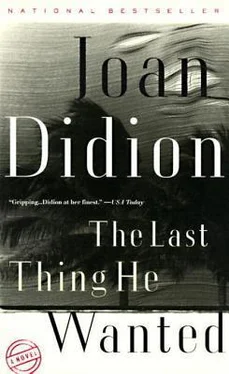In fact she had mentioned this during the course of her Westlake Career Day workshop.
Melissa Simon had again raised her hand. She had a point she wanted to make. The point she wanted to make was that “nobody from the media could have ever gotten into those houses if the families had normal security and their public relations people were doing their job.”
Which had prompted Elena to raise the Westlake Career Day stakes exponentially by suggesting, in words that either did or did not include the phrase “try living in the real world for a change,” that very few families in the world outside three or four well-defined neighborhoods on the West Side of Los Angeles County had either public relations people or what one very fortunate eighth grader might call “normal security.”
Which had caused Wynn Janklow, after this was reported to him the next day by three different people (Mort Simon’s partner, Mort Simon’s lawyer, and the young woman who was described as Mort Simon’s “issues person”), to leave half his lunch at Hillcrest uneaten in order to call Elena.
“I hear you’ve been telling our friends’ kids their parents live in a dream world.”
In the first place, she said, this was not an exact quotation.
He said something else but the connection was bad.
In the second place, she said, Mort Simon was not her friend. She didn’t even know Mort Simon.
Wynn was calling from his Mercedes, driving east on Pico, and had turned up Robertson before his voice faded back in.
“You want everybody in town saying you talk like a shiksa,” he had said, “you’re getting the job done.”
“I am a shiksa,” she had said.
“That’s your problem, not mine,” he had said.
In fact she did know Mort Simon.
Of course she knew Mort Simon.
The house in Beverly Hills where she sat on the sidewalk waiting for the pool report on the celebrity fund-raiser was as it happened Mort Simon’s house. She had even seen him briefly, lifting a transparent flap of the Regal Rents tent to survey the barricade behind which the press was waiting. He had looked directly at her but such was his generalized view of the world outside his tent that he had not recognized her and she had not spoken.
“Send out some refreshments,” she had heard him say to a waiter before he dropped the flap, although no refreshments ever materialized. “Like, you know, diet Pepsi, water, I’m not paying so they can tank up.”
The wife and daughter no longer lived in the house. The wife and daughter had moved to a town house just inside the Beverly Hills line from Century City and the daughter had transferred from Westlake to Beverly Hills High School. Catherine had told her that.
Living in the real world.
We had a real life and now we don’t.
She put that out of her mind.
Other lessons.
More recent venues.
Not long after moving to Washington she had interviewed an expert on nuclear security who had explained how easy it would be to score plutonium. The security for nuclear facilities, he said, was always contracted out. The contractors in turn hired locally and supplied their hires with minimum rounds of ammunition. Meaning, he had said, “you got multimillion-dollar state-of-the-art security systems being operated by downsized sheriff’s deputies with maybe enough ammo to take down a coyote.”
She remembered exactly what he said because the interview had ended up in the Sunday magazine and this had been the pull quote.
If she could think of the man with the ponytail as a downsized sheriff’s deputy, a downsized sheriff’s deputy lacking even a multimillion-dollar state-of-the-art security system, this would be all right.
All it would take was nerve.
All it would take was a show of belonging wherever it was she wanted to be.
She got up, brushed the grass off her legs and walked to the open door of the concrete structure off the apron. The man with the ponytail was seated at a wooden crate on which there was an electric fan, a bottle of beer and a worn deck of Bicycle cards. He drained the beer, lobbed the bottle into a metal drum, and, with two fingers held stiff, turned over a card.
“Shit,” the man said, then looked up.
“You’re supposed to see that I get to San José,” she said. “They were supposed to have told you that.”
The man turned over another card. “Who was supposed to tell me that.”
This was going to require more work than the average telephone crew, pool man, dog groomer.
“If I don’t get to San José they’re going to be wondering why.”
“Who is.”
She gambled. “I think you know who.”
“Give me a name.”
She had not been given names. She had asked Barry Sedlow for names and he had talked about compartmentalization, cutouts, need-to-know.
You wouldn’t give me their real names anyway, she had said. Just give me the names they use.
What’s that supposed to mean, he had said.
The names they use like you use Gary Barnett, she had said.
I’m not authorized to give you that information, he had said. Somebody’s supposed to meet you. Your need-to-know stops there.
Somebody was supposed to meet her but somebody did not meet her.
Somebody was supposed to make the payment and somebody had not made the payment.
She was aware as she watched the man turn over cards of a sudden darkening outside, then of lightning. There was a map of Costa Rica on the wall of the concrete structure, reinforcing the impression that this was Costa Rica but offering no clue as to where in Costa Rica. The overhead light flickered and went out. The electric fan fluttered to a stop. In the absence of background noise she realized that she had been hearing the whine of an overworked refrigerator, now silent.
The man with the ponytail got up, opened the refrigerator, and took another beer from its darkened interior. He did not offer one to Elena. Instead he sat down and turned over another card, whistling softly between his teeth, as if Elena were invisible.
Who is.
I think you know who.
Give me a name.
“Epperson,” she said. She seized the name from the ether of the past ten days. “Max Epperson.”
The man with the ponytail looked at her, then shuffled the cards and got up. “I could be overdue a night or two in Josie,” the man said.
When I am away from this I tend to elongate the time sequence, which was in fact quite short. It was early on the morning of June 26 1984 when Elena McMahon left Fort Lauderdale-Hollywood International Airport on the L-100, and late the same morning when the L-100 landed somewhere in Costa Rica. It was close to midnight of the same day (first there had been a bridge washed out, then a two-hour stop parked outside what seemed to be a military installation) when Elena McMahon got to San José. You’re doing nothing, the man with the ponytail had said when she asked what they were doing at the military installation. What I’m doing doesn’t concern you.
He had gotten out of the truck.
Anyone asks, he had said, tell them you’re waiting for Mr. Jones.
From the time he reappeared two hours later until they reached San José he had not spoken. He had instead sung to himself, repeated fragments of what appeared to be the same song, so inaudibly that she knew he was singing only by the periodic spasms of pounding on the steering wheel as he exhaled the words “great balls of fire.” In San José he had driven directly to a hotel on what appeared to be a downtown side street. Free ride ends here, he had said. Seen from the unlit street the hotel had an impressive glass porte cochere and polished brass letters reading HOTEL COLONIAL but once she was inside the small lobby the promise faded. There was no air-conditioning. An industrial fluorescent light flickered overhead, casting a sickly light on the stained velour upholstery of the single chair. As she waited for the desk clerk to finish a telephone call she had begun to find it inauspicious that the man with the ponytail had brought her to this hotel without ever asking where she wanted to go (in fact she would have had no idea where to go, she had never before been in San José), just pulled directly under the porte cochere and stopped, letting the engine idle as he waited for her to get out.
Читать дальше












